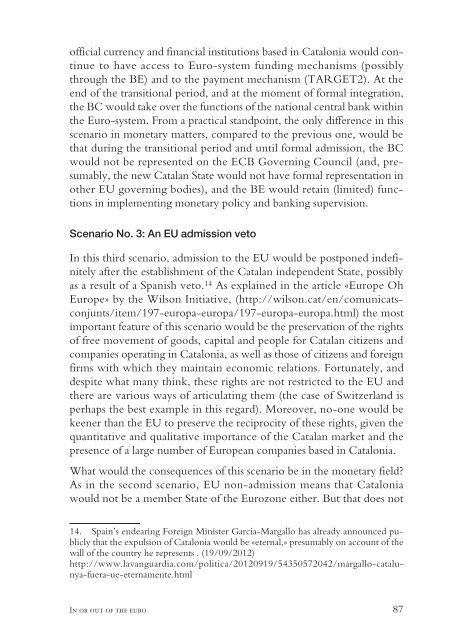The Economy of Catalonia
the_economy_of_catalonia._questions_and_answers_on_the_economic_impact_of_independence
the_economy_of_catalonia._questions_and_answers_on_the_economic_impact_of_independence
Create successful ePaper yourself
Turn your PDF publications into a flip-book with our unique Google optimized e-Paper software.
<strong>of</strong>ficial currency and financial institutions based in <strong>Catalonia</strong> would continue<br />
to have access to Euro-system funding mechanisms (possibly<br />
through the BE) and to the payment mechanism (TARGET2). At the<br />
end <strong>of</strong> the transitional period, and at the moment <strong>of</strong> formal integration,<br />
the BC would take over the functions <strong>of</strong> the national central bank within<br />
the Euro-system. From a practical standpoint, the only difference in this<br />
scenario in monetary matters, compared to the previous one, would be<br />
that during the transitional period and until formal admission, the BC<br />
would not be represented on the ECB Governing Council (and, presumably,<br />
the new Catalan State would not have formal representation in<br />
other EU governing bodies), and the BE would retain (limited) functions<br />
in implementing monetary policy and banking supervision.<br />
Scenario No. 3: An EU admission veto<br />
In this third scenario, admission to the EU would be postponed indefinitely<br />
after the establishment <strong>of</strong> the Catalan independent State, possibly<br />
as a result <strong>of</strong> a Spanish veto. 14 As explained in the article «Europe Oh<br />
Europe» by the Wilson Initiative, (http://wilson.cat/en/comunicatsconjunts/item/197-europa-europa/197-europa-europa.html)<br />
the most<br />
important feature <strong>of</strong> this scenario would be the preservation <strong>of</strong> the rights<br />
<strong>of</strong> free movement <strong>of</strong> goods, capital and people for Catalan citizens and<br />
companies operating in <strong>Catalonia</strong>, as well as those <strong>of</strong> citizens and foreign<br />
firms with which they maintain economic relations. Fortunately, and<br />
despite what many think, these rights are not restricted to the EU and<br />
there are various ways <strong>of</strong> articulating them (the case <strong>of</strong> Switzerland is<br />
perhaps the best example in this regard). Moreover, no-one would be<br />
keener than the EU to preserve the reciprocity <strong>of</strong> these rights, given the<br />
quantitative and qualitative importance <strong>of</strong> the Catalan market and the<br />
presence <strong>of</strong> a large number <strong>of</strong> European companies based in <strong>Catalonia</strong>.<br />
What would the consequences <strong>of</strong> this scenario be in the monetary field?<br />
As in the second scenario, EU non-admission means that <strong>Catalonia</strong><br />
would not be a member State <strong>of</strong> the Eurozone either. But that does not<br />
14. Spain’s endearing Foreign Minister García-Margallo has already announced publicly<br />
that the expulsion <strong>of</strong> <strong>Catalonia</strong> would be «eternal,» presumably on account <strong>of</strong> the<br />
will <strong>of</strong> the country he represents . (19/09/2012)<br />
http://www.lavanguardia.com/politica/20120919/54350572042/margallo-catalunya-fuera-ue-eternamente.html<br />
In or out <strong>of</strong> the euro 87


